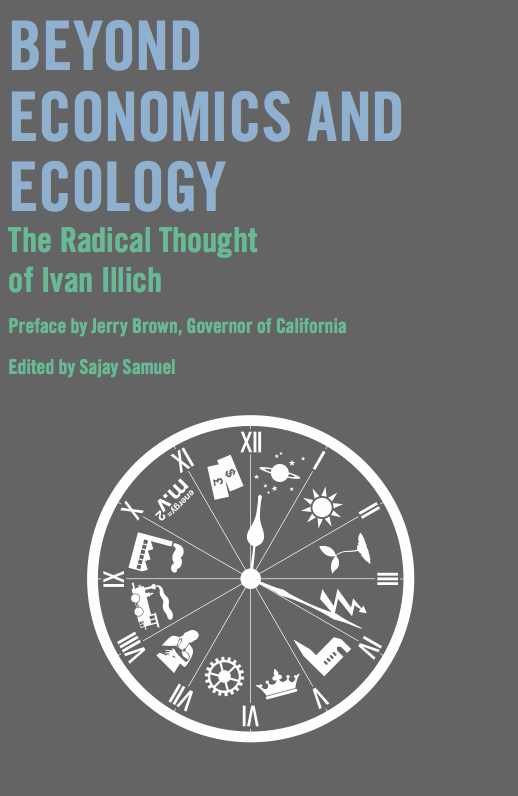
Ivan Illich, Jerry Brown, Sajay Samuel
Each of the four essays reprinted here was written for a specific occasion and together comprise only the smallest selection from a larger corpus questioning commodity and energy-intensive economies. The essays are presented thematically instead of chronologically to offer a better view of the sweep of Illich’s argument. In the first two, “War against Subsistence” and “Shadow Work,” Illich reveals both the ruins on which the economy is built and the blindness of economics which cannot but fail to see it. The second two essays, “Energy and Equity” and “The Social Construction of Energy,” unearth the nineteenth century invention and subsequent consequences of ‘energy’ thought of as the unseen cause of all ‘work’ whether done by steam engines, humans, or trees. The science of ecology relies on this assumption and, as Illich explained, unwittingly fuels the addiction to energy. The close dance of energy consumption and economic growth is characteristic of not just industrially geared societies. After all, energy consumption steadily increases even in so-called post-industrial societies, fueling the fortunes of Google and Apple no less than Wal-Mart.
About the Author
Ivan Illich was born in Vienna to a Croatian father and Sephardic-Jewish mother, and had as native languages Italian, French and German. He later learnt Serbo-Croatian, the language of his grand-fathers, then Ancient Greek and Latin, as well as Spanish, Portuguese and Hindi. Thereafter, he studied histology and crystallography at the University of Florence (Italy), theology and philosophy at the Pontifical Gregorian University in the Vatican (1942-1946) and medieval history in Salzburg In 1951 he was assigned as an assistant parish priest in New York City. He was then appointed in 1956, aged 30, vice-rector of the Catholic University of Puerto Rico. There Illich met Everett W. Reimer, and the two began to analyze their own function as "educational" leaders. In 1959, he traveled through-out South America by foot and in bus. In 1961 Illich founded the Centro Intercultural de Documentación (CIDOC, or International Documentation of Center) at Cuernavaca in Mexico, ostensibly a research centre offering language courses to missionaries from North America and voluntaries of John F. Kennedy's Alliance for Progress program. However, his intent was to counterfoil the Vatican's participation in the modern development of the so-called Third World. Illich looked askance at the liberal pity or conservative imperiousness that motivated the global rising tide of industrial development. He viewed such emissaries as a form of industrial hegemony, and as such, an act of war on subsistence. He sought to teach missionaries, dispatched by the Church to rather identify themselves as tourists and guests of the host country. After 10 years, the CIDOC's critical analysis of the institutional actions of the Church brought the CIDOC into conflict with the Vatican. Illich was called to Rome to be questioned, in part after a report from the CIA. In 1976, apparently concerned by the influx of formal academics and possible side-effects of its own institutionalization, Illich, with consent from its members, shut the center down. Several members subsequently continued language schools in Cuernavaca, some of which still exist. Illich himself resigned as a priest in the late 1960s. Illich was popular among leftist intellectuals in France in the 1970s but his influence declined after François Mitterrand's election in 1981; he was considered too pessimist at a time when the French Left took on governmental responsibilities. From the 1980s, Ivan Illich traveled extensively, mainly splitting his time between the United States, Mexico, and Germany. He held an appointment as Visiting Professor of Philosophy and of Science, Technology, and Society at Penn State, and also taught at the University of Bremen. During his later years, he suffered from a cancerous growth on his face that, in accordance with his critique of professionalized medicine, he treated with traditional methods. He regularly smoked opium to deal with the pain caused by this tumor. At an early stage, he consulted a doctor about having the tumor removed, but there was too great a chance of losing his ability to speak, he was told, so he lived with the tumor as best he could. My mortality, he called it.
Price: £12.95 UK, $ 17.95 US & Canada
Format: Paperback
Publication: August 2013
ISBN: 978-0-7145-0938-8 (print)
240 pages
ASIN:BOOE258QK £ 12.95 (e-book)
Social Studies
 age
age